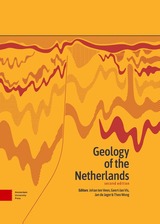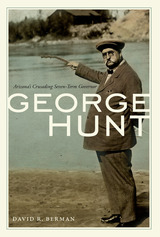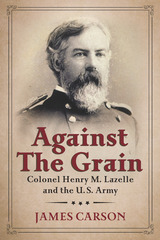
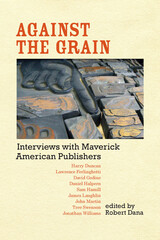
Against the Grain is a collection of interviews with nine small press publishers, each one characterized by strength of resolve and a dedication to good books. Each press reflects, perhaps more directly than any large trade publisher could, the character of its founder; and each has earned its own place in the select group of important small presses in America.
This collection is the first of its kind to explore with the publishers themselves the historical, aesthetic, practical, and personal impulses behind literary publishing. The publishers included are Harry Duncan (the Cummington Press), Lawrence Ferlinghetti (City Lights), David Godine (David R. Godine), Daniel Halpern (the Ecco Press), Sam Hamill and Tree Swenson (Copper Canyon Press), James Laughlin (New Directions), John Martin (Black Sparrow), and Jonathan Williams (the Jargon Society). Their passion for books, their belief in their individual visions of what publishing is or could be, their inspired mulishness crackle on the page.
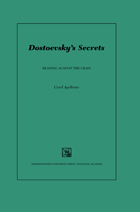
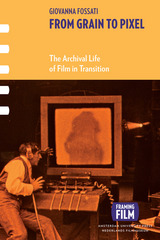
Film is in a state of rapid change: the transition from analog to digital is profoundly affecting not just filmmaking and film distribution but a number of other facets of the industry, including the ways in which films are archived. In From Grain to Pixel—the first volume in the new Framing Filmseries from Amsterdam University Press—Giovanna Fossati brings together scholars and archivists to discuss their theories on digitization and to propose new possibilities for future archives.
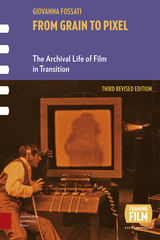
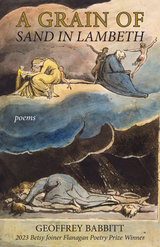
Each poem in this collection inhabits a moment of Blake’s life, offering a vivid glimpse into his unique perspective—a perspective that rejected the normative for the transformative power of imagination. From his visionary watercolors to his provocative views on oil painting, these poems draw readers into Blake’s world, where reality and the unseen converge in prismatic intensity.
A Grain of Sand in Lambeth is an invitation to experience the world through Blake’s eyes—a world where imagination reigns supreme and art is a living force.
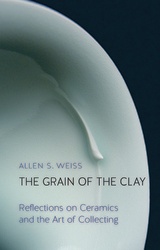
Weiss examines the vast stylistic range of ceramics and investigates both the theoretical and personal reasons for viewing, using, and collecting them. Relating ceramics to other arts and practices—especially those surrounding food—he explores their different uses such as in the celebrated tea ceremony of Japan. Most notably, he considers how works previously viewed as crafts have found their rightful way into museums, as well as how this new-found engagement with finely wrought natural materials may foster an increased ecological sensitivity. The result is a wide-ranging and sensitive look at a crucial part of our material culture.
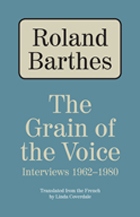
This book brings together the great majority of Barthes’s interviews that originally appeared in French in Le Figaro Littéraire, Cahiers du Cinéma, France-Observateur, L'Express, and elsewhere. Barthes replied to questions—on the cinema, on his own works, on fashion, writing, and criticism—in his unique voice; here we have Barthes in conversation, speaking directly, with all his individuality. These interviews provide an insight into the rich, probing intelligence of one of the great and influential minds of our time.
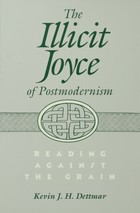
For nearly three quarters of a century, the modernist way of reading has been the only way of reading James Joyce—useful, yes, and powerful but, like all frameworks, limited. This book takes a leap across those limits into postmodernism, where the pleasures and possibilities of an unsuspected Joyce are yet to be found.
Kevin J. H. Dettmar begins by articulating a stylistics of postmodernism drawn from the key texts of Roland Barthes, Mikhail Bakhtin, and Jean-François Lyotard. Read within this framework, Dubliners emerges from behind its modernist facade as the earliest product of Joyce’s proto-postmodernist sensibility. Dettmar exposes these stories as tales of mystery, not mastery, despite the modernist earmarks of plentiful symbols, allusions, and epiphanies. Ulysses, too, has been inadequately served by modernist critics. Where they have emphasized the work’s ingenious Homeric structure, Dettmar focuses instead upon its seams, those points at which the narrative willfully, joyfully overflows its self-imposed bounds. Finally, he reads A Portrait of the Artist and Finnegans Wake as less playful, less daring texts—the first constrained by the precious, would-be poet at its center, the last marking a surprising retreat from the constantly evolving, vertiginous experience of Ulysses.
In short, The Illicit Joyce of Postmodernism explores what happens when the extra-literary pronouncements of Eliot, Pound, and Joyce, as well as Joyce’s early critics, are set aside and a new, “unauthorized” Joyce is allowed to appear. This postmodern Joyce, more willful and less easily compartmentalized, stands as a counterpoint to the modernist Joyce who has perhaps become too familiar.

Quality Maintenance in Stored Grains and Seeds was first published in 1986. Minnesota Archive Editions uses digital technology to make long-unavailable books once again accessible, and are published unaltered from the original University of Minnesota Press editions.
Storage molds are a major cause of quality loss in grains and seeds held in farm bins and tanks, in commercial elevators and warehouses, and in barge and ship transport. The damage done by these storage molds is at first invisible, but later shows up as caking, mustiness, total spoilage of part or all of the grain, and heating - sometimes to the temperature of ignition. The authors, both of whom have had extensive first-hand field and laboratory experience with these grain storage fungi and the problems they cause, summarize in readable and readily understandable form the basic principles and specific practices to be followed in order to minimize such losses.
Chapters are devoted to grain grades and quality; storage fungi; conditions that promote or prevent loss in quality; spoilage in barge and ship transport; mycotoxins (toxic compounds produced by fungi growing in grains and feeds) and mycotoxicoses (the diseases caused in animals that consume such toxic products); insects, mites, and storage fungi, quality control; and identification of storage fungi as an aid in evaluation of grain condition and storability.
READERS
Browse our collection.
PUBLISHERS
See BiblioVault's publisher services.
STUDENT SERVICES
Files for college accessibility offices.
UChicago Accessibility Resources
home | accessibility | search | about | contact us
BiblioVault ® 2001 - 2025
The University of Chicago Press


